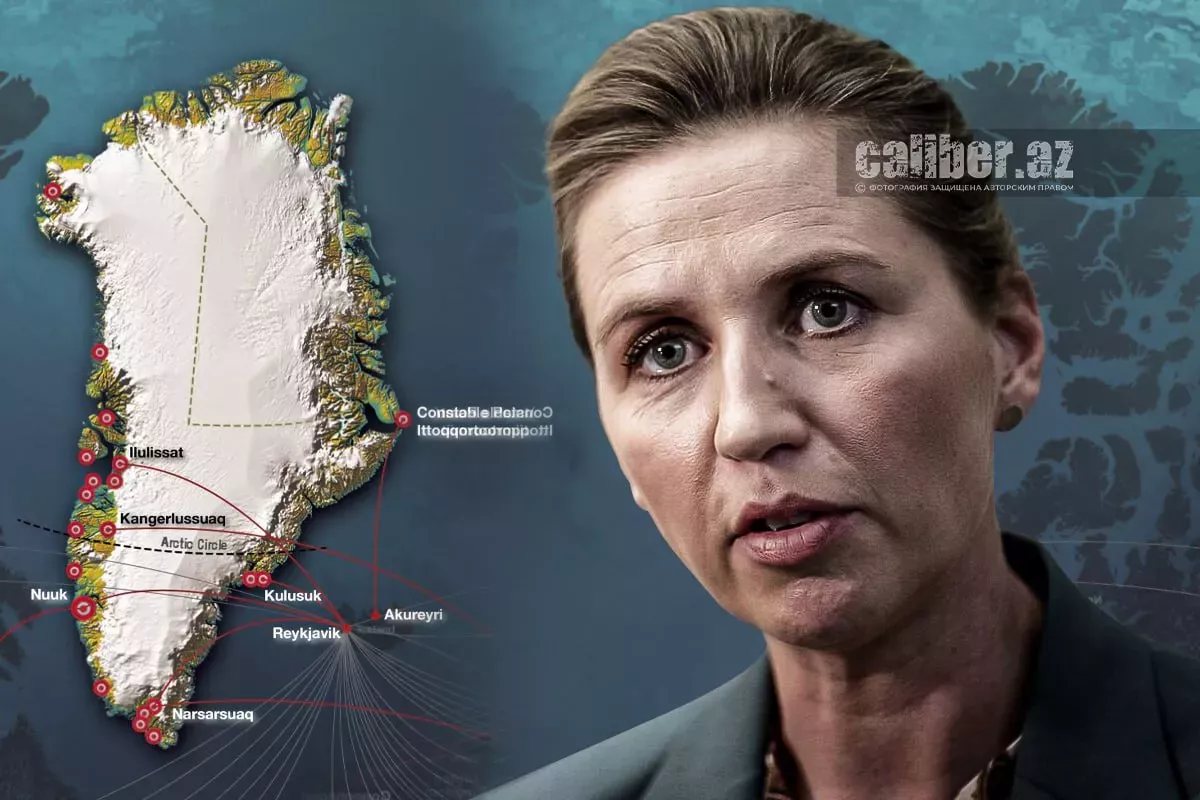Why does Trump want Greenland? Expert opinions on Caliber.Az
U.S. President Donald Trump, in an interview with NBC News, stated that he has had "absolutely real conversations" about Greenland, which is currently an autonomous territory of Denmark. "We will get Greenland. Yeah, 100%," Trump said. According to him, there is a “good possibility that we could do it without military force” but that he wouldn’t “take anything off the table.” When asked about the message acquiring Greenland would send to Russia and the rest of the world, Trump responded: "I don’t really think about that. I don’t really care. Greenland’s a very separate subject, very different. It’s international peace. It’s international security and strength." "You have ships sailing outside Greenland from Russia, from China and from many other places. And we're not going to allow things to happen that are going to be — that are going to hurt the world or the United States," added the U.S. President.
Earlier, U.S. Vice President J.D. Vance visited Greenland with his wife Usha and met with military personnel at the U.S. Space Force base in Pituffik on Greenland’s northwest coast. "Our message to Denmark is very simple. You have not done a good job by the people of Greenland," Vance stated during his visit.
So, U.S. leader Donald Trump is 100% confident in the success of his initiative to annex Greenland. He believes this is a matter of international peace, security, and power.
What are the rational considerations that could make the annexation of Greenland by the U.S. beneficial for the entire world? What exactly do Trump and his allies see as the advantages in this regard?
These questions were addressed by renowned foreign experts in an interview with Caliber.Az.
Andrei Korobkov, a professor of political science and international relations at the University of Tennessee (USA), noted, first and foremost, that the issue is about changing the geopolitical map and the global balance of power.

"Trump is a hard realist, and his approach is not based on ideological, moral, or ethical considerations, but purely on power politics. He is trying to bring global politics back to its classical form. Trump seems to be saying: the conditions have changed, let’s return to the original model of American politics that was shaped by the Founding Fathers, particularly Jefferson.
We see Trump’s strong reaction to the Panama Canal and his attempts to acquire Greenland. This is a response to China’s activities, which has already gained control over many strategic ports around the world.
This is exactly why Trump is eager to make some kind of deal with Putin that would help detach Russia from China. China is showing increasing interest in maritime routes through the Arctic Ocean, which is another factor pushing Trump to attempt to establish control over Greenland," explained the professor.
According to him, the United States has been seeking to annex Greenland for over 200 years, since the early 19th century. "There were specific proposals — in 1946, President Truman offered $100 million to Denmark for it.
However, the situation has changed significantly for a number of reasons. First, due to global warming, it has become much easier to use shipping routes across the Arctic Ocean, and U.S. control over Greenland is crucial in this regard. Secondly, what lies beneath the ice is important to them. It is already known that there are rare earth elements there, including uranium. But the main factor is that Greenland provides control over a vast area of the continental shelf adjacent to its shores. Finally, there is a military-political aspect to this issue. Even during Trump’s first term, a report was prepared stating that Russia has a powerful icebreaker fleet, China is building about forty icebreakers, while the U.S. only has two left. It was Donald Trump who then initiated the construction of new American icebreakers and a deep-water port in Alaska," explained the expert.
In his view, it is now important to expect the development of these ambitions and not treat them as a joke.
"Denmark spends about $100 million annually on subsidies to Greenland. But the Americans could invest several tens, or even hundreds, of billions into its economic development.
Its population is 57,000, and it has a very broad autonomy from Denmark, so it is quite realistic to organize some kind of deal with the Greenlandic government and its population, simply by offering money to each resident of the island. The U.S. already purchased the Virgin Islands and other territories from Denmark and several other countries, including Russia. Sometimes this happened under pressure, and sometimes even without it, simply for political reasons from both sides. Therefore, the search for ways to gain control over Greenland in the U.S. will continue," Korobkov believes.

As American geopolitical and security expert Irina Tsukerman, editor-in-chief of The Washington Outsider, stated, while some may see this idea as unconventional, a deeper analysis reveals compelling reasons why such a development could benefit not only America and Greenland but also the broader geopolitical landscape.
"Greenland’s vast resources, strategic location, and economic potential offer significant advantages that, if properly managed, could enhance global security, economic stability, and international cooperation.
Greenland’s position in the Arctic places it at the crossroads of major geopolitical tensions between the United States, Russia, and China. As Arctic ice melts, new shipping routes are opening, making the region a focal point of military and economic competition. If Greenland were integrated into the United States, it would become a critically important strategic outpost for protecting Western interests and ensuring Arctic stability and security.
Both Russia and China are expanding their presence in the Arctic. Russia has militarised the region, reopening Cold War-era bases, while China has declared itself a ‘near-Arctic state’ and invested heavily in infrastructure projects there. Bringing Greenland into the U.S. fold would provide Washington with a crucial foothold to counter these threats, ensuring that the Arctic remains within the Western sphere of influence rather than falling under authoritarian control.
Greenland is already home to Thule Air Base, a key component of the U.S. missile defense and early warning system. Full integration would allow for an expansion of defense infrastructure, strengthening NATO’s ability to monitor and respond to threats in the North Atlantic and Arctic. This would serve as a deterrent against hostile powers seeking to challenge Western security interests in the region.
Greenland is rich in natural resources, including rare-earth minerals, oil, and gas—commodities that are becoming increasingly critical for global industry and technological advancements. The United States, currently dependent on China for many of these materials, would greatly benefit from securing a direct supply of strategic minerals.
Rare-earth minerals are essential for modern electronics, military technologies, and renewable energy. Currently, China controls the majority of global supply, giving it significant leverage over international markets. Greenland’s deposits could serve as an alternative source, reducing the West’s dependence on Beijing and ensuring a more stable supply chain.
If Greenland were to join the U.S., it would receive massive infrastructure investments, creating jobs and stimulating economic activity. Ports, roads, airports, and technological hubs could be developed, transforming the island into a thriving Arctic economy while also benefiting American businesses seeking new investment opportunities.
By integrating Greenland into the United States, Washington would strengthen its leadership in Arctic affairs and gain leverage in global diplomatic negotiations. U.S. control over Greenland would reassure European allies—particularly Denmark and NATO partners—that the Arctic remains secure under Western leadership. It would also demonstrate that the U.S. continues to actively shape the global order rather than allowing competitors to dictate the terms of engagement," the expert elaborated.
Tsukerman believes that, unlike past territorial acquisitions through conflict or coercion, Greenland’s integration could be a voluntary, mutually beneficial process that respects the will of its people.
"This would set a precedent for other territories considering closer alliances with the United States, demonstrating that economic and security partnerships can evolve into full political integration without the need for aggression.
The Arctic is one of the most critical regions for studying climate change, and Greenland’s vast ice sheets provide invaluable data for global climate research. If Greenland were part of the United States, American scientific institutions would have greater access to conducting large-scale studies, advancing global efforts to understand and mitigate climate-related challenges.
The U.S. could also invest in sustainable development initiatives in Greenland, transforming it into a hub for Arctic research and clean energy projects. This would strengthen America’s role in global climate negotiations while promoting responsible resource management.
Unlike China and Russia, which often exploit resources with little regard for environmental consequences, the United States could implement strict ecological regulations and sustainable extraction methods. This would ensure responsible development of Greenland’s natural wealth, preventing environmental disasters while still reaping economic benefits.
For President Trump and his allies, Greenland represents a rare opportunity for strategic, economic, and diplomatic expansion—one that perfectly aligns with their vision of reviving America’s global stature.
Trump has consistently advocated for strengthening American sovereignty and global influence. Acquiring Greenland would secure a strategic foothold in the Arctic, allowing the U.S. to dominate one of the last untapped frontiers of the world.
Trump’s ‘America First’ policy prioritizes reducing dependence on foreign adversaries for critical resources. Greenland’s mineral wealth and untapped energy potential would make the U.S. even more self-sufficient while simultaneously depriving competitors of the same resources.
Trump’s allies recognize that integrating Greenland into the United States would be a historic achievement, solidifying his legacy as a leader who expanded America’s global influence. This would be an unprecedented move in modern geopolitics, demonstrating that the U.S. remains the most ambitious and capable power in the world.
The idea of Greenland joining America is not just an abstract geopolitical fantasy—it is a practical, strategic step that could redefine the balance of power in the Arctic and beyond. By securing vital resources, strengthening global security, and promoting sustainable development, such integration would benefit not only the United States but also Greenland and the broader international community,” the editor stated.

In her view, despite the challenges—including negotiations with Denmark—the integration process could serve as a model for peaceful expansion, demonstrating that global influence can be achieved through mutual benefit rather than conflict.
"Trump and his allies recognize the vast potential of this vision, and if effectively implemented, it could solidify America’s leadership in the 21st century while ensuring a stable and prosperous future for Greenland and the world.
However, despite these advantages, Trump’s approach ultimately backfired, leading to increased tensions rather than friendly agreements with Denmark and Greenland. The proposal to purchase Greenland was presented in a way that made it seem like a simple real estate transaction rather than a complex geopolitical and diplomatic issue.
This approach overlooked the deep historical and political ties between Denmark and Greenland, resulting in an immediate backlash. Greenlanders, who are gaining increasing autonomy from Denmark, were not consulted before the proposal became public. This sparked resentment, as it appeared that their future was being decided without their input.
Likewise, Denmark, which still manages Greenland’s foreign affairs, viewed the offer as dismissive of its sovereignty. When Danish officials, including Prime Minister Mette Frederiksen, rejected the idea, Trump responded by canceling a planned visit to Denmark and publicly criticizing its leadership. This escalated tensions and turned what could have been a diplomatic discussion into an unnecessary controversy.
The notion that Greenland is something to be simply purchased—rather than a self-governing territory with its own people, culture, and political aspirations—was perceived as disrespectful. Greenlanders expressed disappointment at being treated as a commodity rather than a population with the right to self-determination.
Instead of initiating a constructive dialogue about the Arctic and potential partnerships, Trump’s approach brought Denmark and Greenland closer together in their opposition to U.S. intervention. It also provided other powers, such as China and Russia, with an opportunity to portray the U.S. as a destabilising force in the region.
While the inclusion of Greenland into the U.S. could have theoretical advantages, Trump and his allies’ handling of the issue proved counterproductive. Rather than fostering goodwill and exploring long-term partnerships, their approach led to diplomatic tensions, backlash from Greenland and Denmark, and an overall loss of trust in Arctic negotiations.
A more balanced and cooperative strategy—perhaps focused on investments, security cooperation, or gradual integration—could have yielded better results," Tsukerman believes.








